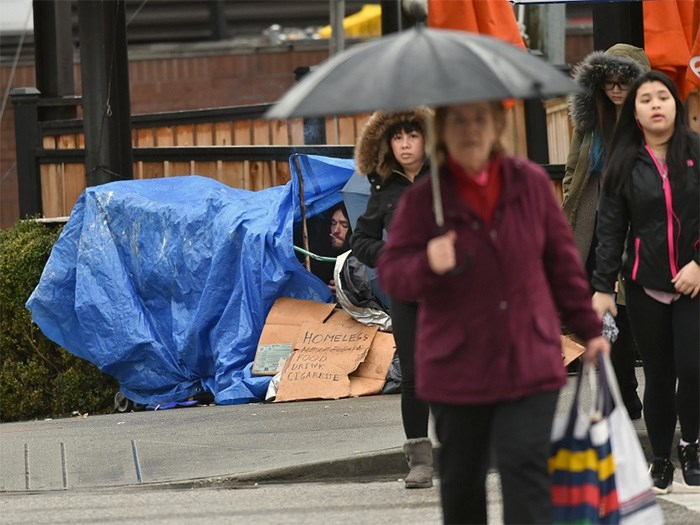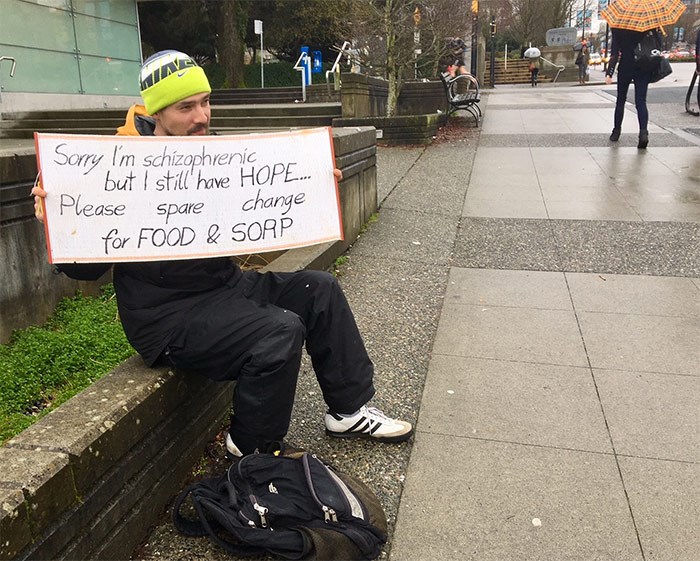 Denis Quesnel, 34, was living under a tarp at Cambie and Broadway Wednesday morning. He was expected to be counted in the city’s annual homeless count, which began Tuesday. Photo Dan Toulgoet
Denis Quesnel, 34, was living under a tarp at Cambie and Broadway Wednesday morning. He was expected to be counted in the city’s annual homeless count, which began Tuesday. Photo Dan Toulgoet
Two blocks from Vancouver city hall, at the intersection of Cambie and Broadway, Denis Quesnel was trying to make the best of his 34-year-old life as he sat under a rain-soaked blue tarp and tried to roll a cigarette with the little tobacco he had left.
He was bundled in a blanket on a sidewalk, sitting next to a shopping cart and his upturned bicycle as people passed him by in the morning rush on Wednesday.
“I’m a little wet and no more cigarettes,” said Quesnel, a former Quebecker who spoke in a mix of English and French. “I just get tired. I got no goal, I got no more dream — I got nothing. I don’t know what I’m going to do for eat today.”
Quesnel’s story is not unlike many collected in the city’s annual homeless count, the most recent of which began Tuesday and was to carry on into Wednesday. He said he was a victim of abuse as a child, got involved in crime as he grew up, did some time in jail, then “left Quebec to have a new life” in B.C.
For five years he worked as a roofer in Abbotsford, had a place to live and a steady girlfriend. Then he injured his shoulder in a hiking accident, couldn’t work and broke up with his girlfriend. Quesnel didn’t make it clear how he lost his home, but said he has been homeless for a year.
“I want job,” he said. “I want to get back on the roof.”
 Michael, who is living with a mental illness, lives on his girlfriend’s couch and is on a waiting list for housing. Photo Mike Howell
Michael, who is living with a mental illness, lives on his girlfriend’s couch and is on a waiting list for housing. Photo Mike Howell
Farther up Cambie Street, on the same morning, Michael sat on a short concrete ledge near city hall and held a sign that read: “Sorry, I’m schizophrenic but I still have hope. Please spare change for food and soap.”
Michael, 32, wouldn’t provide his surname, but said he was originally from Germany and moved to Vancouver in 2011. He said he was staying on his girlfriend’s couch and waiting for the provincial government’s housing arm — B.C. Housing — and Coast Mental Health to find him a permanent home.
“There’s thousands of people on the waiting list,” he said, noting Vancouver is a popular spot for homeless people. “Lots of people move to Vancouver — the homeless people — because it’s not as cold, so more better to live homeless.”
Learning that the Courier was about to attend a news conference with Mayor Gregor Robertson regarding this week’s homeless count, Michael said he would tell the mayor to open more shelters and build more permanent housing for people living with a mental illness.
Robertson told reporters Wednesday at city hall the city continues to identify sites for the construction of 600 units of temporary modular housing for homeless people. So far, 78 units spread over two buildings in Marpole have opened.
The mayor said 1,000 new units of social housing will also open by the end of the year but noted the city still needs to push the provincial and federal governments to commit more funding to housing geared for low-income people.
“We’re finally seeing movement with a new federal and provincial government to take homelessness more seriously, but it will take years of concerted effort to make this change,” said Robertson, who is not seeking a fourth term as mayor in this October’s municipal election. “It’s an extraordinarily difficult challenge and we’re seeing it dramatically impacting other cities of the region and down the West Coast.”
Last year’s Metro Vancouver homeless count revealed that 2,138 people in Vancouver were homeless, with 537 of those living on the street or in a vehicle. That was the highest number of homeless people counted since the city began its annual counts almost a decade ago.
Of those people surveyed in the count, 636 (or 59 per cent) said they were dealing with an addiction and 455 (or 44 per cent) were living with a mental illness. A total of 737 (or 79 per cent) had one or more health conditions.
This year’s count comes as the city continues to fight an opioid crisis that killed 365 people in Vancouver last year, an unprecedented number of drug deaths in Vancouver. Some anti-poverty advocates have said recently they fear a drop in the homeless population will not be because people have found homes, but because homeless people with addictions have died.
But Robertson noted the majority of people who died of an overdose were found inside single-room-occupancy hotels and other homes across the city — not just the Downtown Eastside, and not just the severely addicted.
“There’s not a direct correlation, but certainly there’s overlap,” said the mayor, who deferred to Ethel Whitty, the city’s director of homelessness services, who suggested “the only way [the opioid crisis] could possibly impact is if in fact people who were living in [single-room-occupancy hotels] died of overdoses and then those rooms were backfilled with homeless people.”
Robertson, who promised to end so-called street homelessness by 2015, was asked by a reporter what his legacy will be on homelessness. He said housing and homelessness has been a top priority “for my entire time in office, and my hope is my legacy to focus on this as a city continues whoever is here at city hall.”
Preliminary findings of this year’s homeless count will go before city council in May, with a final report completed by June. Some of the findings in the 2017 count, which was collected in a survey from a majority of people counted, included:
- Indigenous people were again overrepresented, comprising 39 per cent of Vancouver’s homeless population, yet make up just two per cent of the city’s overall population.
People aged 25 to 54 continued to comprise the majority of the homeless population at 68 per cent.
- Vancouver saw an increase in seniors aged 55 and older, representing 21 per cent of the homeless population. That was a jump from 17 per cent counted in the last regional count.
- Young people aged 24 and under represented 15 per cent of the homeless population.
- Men represent 76 per cent of the homeless population, with women making up 22 per cent and two percent identifying as another gender.
- A total of 68 per cent of Vancouver’s total homeless population were people who were living in the city when they became homeless.
mhowell@vancourier.com
@Howellings


